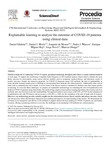Explainable learning to analyze the outcome of COVID-19 patients using clinical data

Ver/
Use este enlace para citar
http://hdl.handle.net/2183/36391
A non ser que se indique outra cousa, a licenza do ítem descríbese como Atribución-NoComercial-SinDerivadas 3.0 España
Coleccións
- Investigación (FIC) [1683]
Metadatos
Mostrar o rexistro completo do ítemTítulo
Explainable learning to analyze the outcome of COVID-19 patients using clinical dataAutor(es)
Data
2023Cita bibliográfica
D. Olañeta, D. I. Morís, J. de Moura, P. J. Marcos, E. Míguez Rey, J. Novo, and M. Ortega; "Explainable learning to analyze the outcome of COVID-19 patients using clinical data", Procedia Computer Science, Vol. 225, pp. 238-247, 2023, doi: 10.1016/j.procs.2023.10.008
Resumo
[Abstract]: Patients at high risk of contracting COVID-19 require specialized monitoring throughout their illness to ensure optimal treatment at each stage. To support this monitoring, Computer-Aided Diagnosis (CAD) methods analyze clinical data to estimate the most likely outcome for each patient, using various clinical variables such as symptoms, medical history, and laboratory results to predict outcomes. Despite the numerous proposals for COVID-19 diagnosis using CAD methods, the lack of explainability in many machine learning models poses a challenge in incorporating these methods into clinical practice. Additionally, other crucial tasks such as estimating the risk of death or severe forms of the disease must be considered to identify cases that require greater monitoring. To overcome these challenges, we propose an explainable methodology for estimating the risk of hospitalization and death in COVID-19 patients using clinical data. Our methodology employs four machine learning algorithms, three feature selection methods, and a decision tree to provide explainability. Our approach achieves an accuracy of 86.16% ± 0.74% for the estimation of hospitalization risk with 29 features, and an accuracy of 86.40% ± 1.80% for the estimation of the risk of death with 26 features. Moreover, our methodology provides valuable insights into the relationship between clinical variables and patient outcomes, which can inform more robust and informed clinical decision-making and improve our understanding of the disease. We demonstrate the potential of our transparent and effective CAD methods to support clinical decision-making in COVID-19 patient care and further research, offering a promising solution to overcome the challenges in incorporating CAD methods into clinical practice.
Palabras chave
Feature selection
Explainable machine learning
Decision trees
Outcome estimation
COVID-19
Explainable machine learning
Decision trees
Outcome estimation
COVID-19
Versión do editor
Dereitos
Atribución-NoComercial-SinDerivadas 3.0 España






